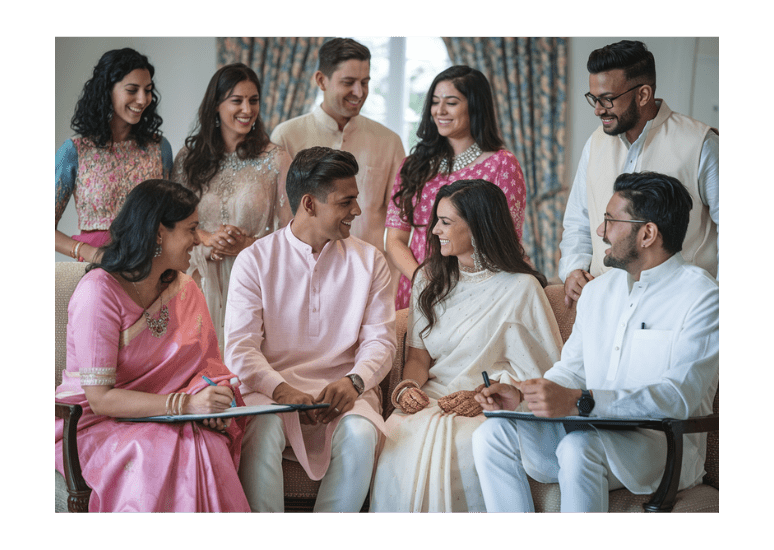Court marriage
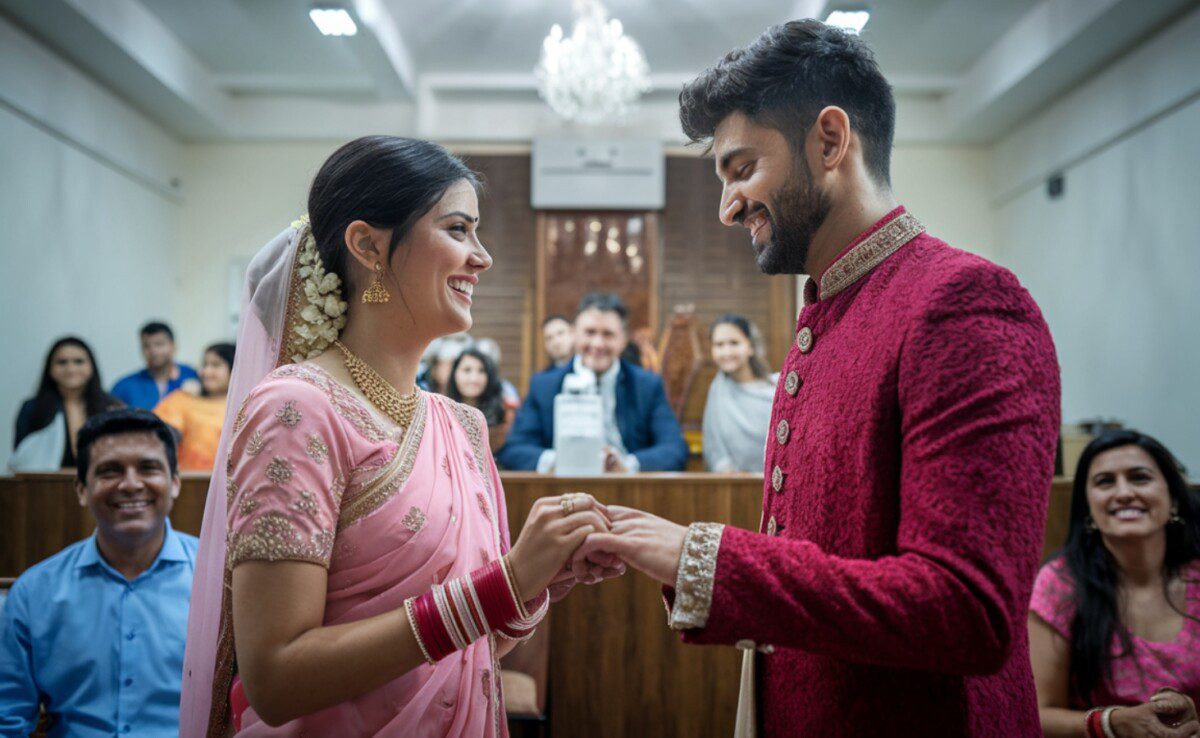
Legalize Your Love
At MyLoveMarriage.com, we provide comprehensive support for court marriages in India, which is a legally recognized and secular way to formalize a relationship. Court marriages are carried out and registered under the Special Marriage Act, 1954, making them a favoured choice for couples from diverse backgrounds who wish to marry without elaborate religious or cultural ceremonies. At MyLoveMarriage.com, we assist couples through every step of the court marriage process, ensuring a smooth and stress-free experience while respecting their privacy and choices. With our trusted legal marriage services , you can be confident that your journey will be handled with expertise and care.
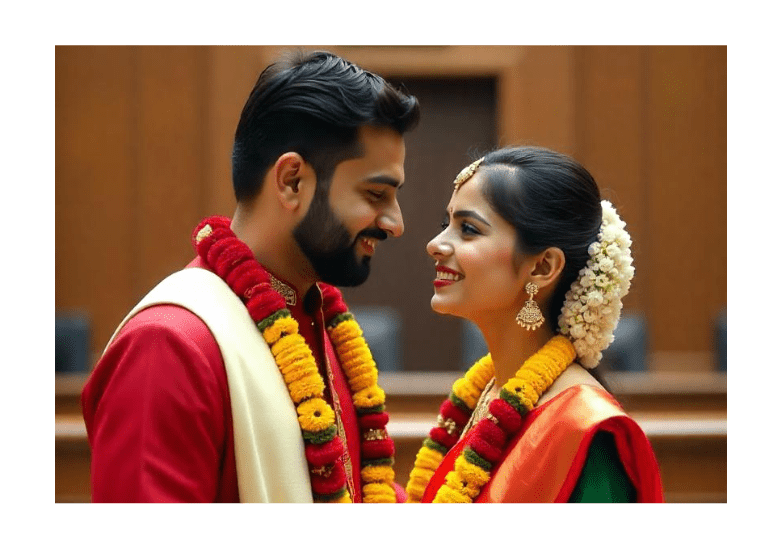
Documents Required for Court Marriage
At MyLoveMarriage.com, we strive to make the court marriage process as smooth as possible by guiding you through the necessary documentation. To complete a court marriage in India, you will need to provide the following documents:
1. Identity Proof: You must submit one of the following as proof of identity:
⦁ Aadhaar Card, Passport, Voter ID, Driving License.
2. Address Proof: To confirm your current address, you can provide one of these documents:
⦁ Rent Agreement, Utility Bills, Passport, Voter ID
3. Date of Birth Proof: A valid proof of your date of birth can be shown through any of the following documents:
⦁ Birth Certificate, 10th or 12th Marksheet, Passport
4. Passport-Size Photographs: You will need to submit 8 passport-size photos, with 4 photos from each partner.
5. Marital Status Proof (if applicable): If either partner has been previously married, the following documents are required:
⦁ Divorce Decree (for divorcees) & Death Certificate (for widows or widowers)
6. Witness Documents: For the marriage to be solemnized, you will need to provide:
⦁ Identity and address proof for each witness
⦁ Passport-size photographs of three witnesses who will be present at the time of the marriage
The court marriage process can proceed without any issues by ensuring you have all the necessary documents ready.
Eligibility for Court Marriage in India
At MyLoveMarriage.com, we assist couples in navigating the legal requirements for court marriages in India, ensuring a smooth and lawful union. Court marriages are regulated by the Special Marriage Act, 1954, which outlines specific eligibility criteria that must be met before the marriage can take place. Here are the key conditions:
1. Age Requirements: The law sets minimum age requirements to ensure that both individuals are of legal age to marry:
⦁ The male partner must be at least 21 years old & The female partner must be at least 18 years old.
2. Mental Capacity: Both parties must have sound mental capacity at the time of marriage. They should be:
⦁ Capable of understanding the nature of marriage & able to provide valid and informed consent to the union.
3. Marital Status: To qualify for court marriage, individuals must meet the following conditions regarding their marital status:
⦁ Neither party should have a living spouse at the time of the marriage.
⦁ If either individual was previously married, they must present legal proof of the dissolution of the earlier marriage, such as a Decree of Divorce or a Death Certificate in the case of a deceased spouse.
4. Non-Prohibited Relationships: The couple must not fall within the prohibited degrees of relationship as defined by their respective customs and personal laws. However, if such relationships are permitted by the customs governing either party, the marriage may proceed.
At MyLoveMarriage.com, we offer comprehensive support, helping couples fulfill these requirements with clarity and ease. Whether it's gathering necessary documents or addressing specific legal concerns, we are dedicated to making your journey toward a court marriage stress-free and smooth.
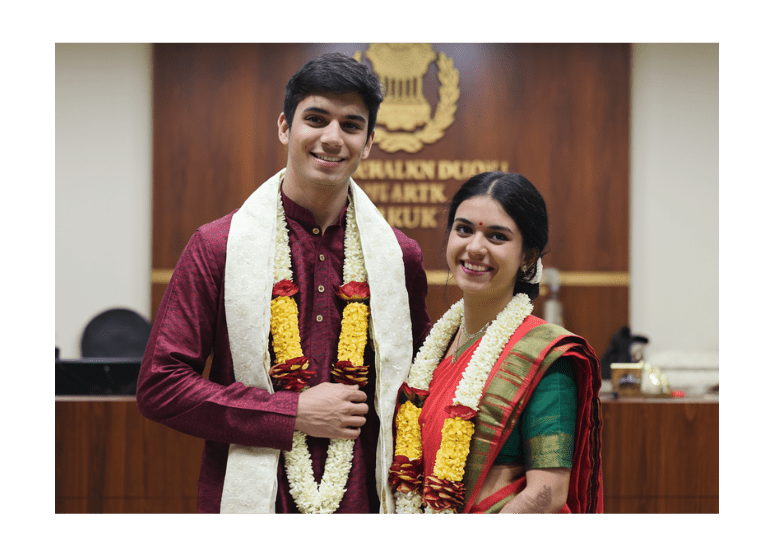
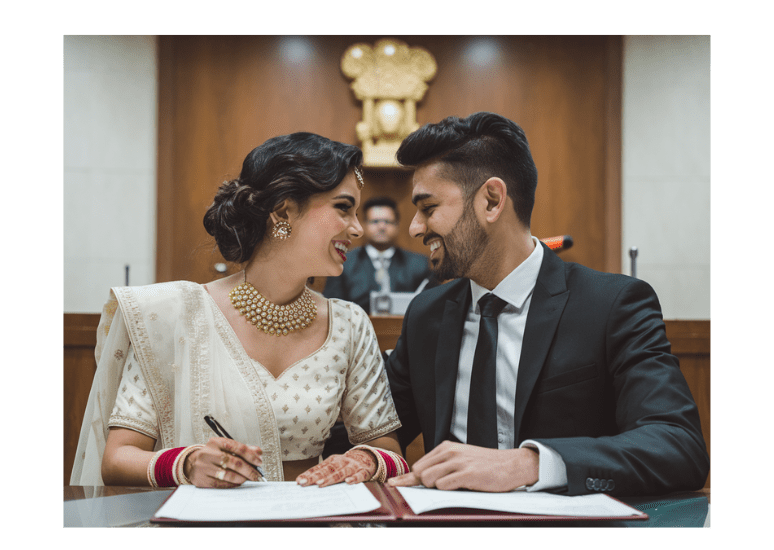
Procedure for Court Marriage in India
At MyLoveMarriage.com, we strive to make the court marriage process smooth, transparent, and fully compliant with the Special Marriage Act, 1954. Here’s a detailed step-by-step guide for couples looking to formalize their marriage through the court:
1. Filing the Notice of Intended Marriage: The first step in the court marriage process is to submit a Notice of Intended Marriage.
⦁ The couple must file this notice with the Marriage Registrar in the district where at least one of them has been residing for 30 days prior to submission.
⦁ The notice should be submitted in the prescribed format under the Special Marriage Act.
2. Publication of Notice: Once the notice is received, the Marriage Registrar will publicly display it at their office for 30 days. This serves as an invitation for any objections to be raised.
⦁ During this time, anyone can challenge the marriage if they believe it violates any provisions of the Special Marriage Act.
3. Addressing Objections:
⦁ If an objection is raised, the Marriage Registrar will investigate the matter and resolve it within 30 days.
⦁ If no objections are raised or if the objections are deemed invalid, the marriage can move on to the next step.
4. Declaration and Solemnization: After the 30-day notice period, the couple, along with three witnesses, must appear before the Marriage Registrar on the agreed date.
⦁ Both partners will sign a declaration, confirming that they meet all the eligibility criteria outlined in the Special Marriage Act.
⦁ The Registrar will then solemnize the marriage in the presence of the couple and the witnesses.
5. Issuance of Marriage Certificate: Once the marriage is solemnized, the Marriage Registrar will issue an official Marriage Certificate. This certificate serves as legal proof of the marriage and is recognized for all legal purposes.
At MyLoveMarriage.com, we support couples throughout the entire court marriage process, making sure everything is done smoothly and legally. From submitting the notice to obtaining your marriage certificate, we help you navigate a stress-free path to formalizing your relationship.
Benefits of Court Marriage in India
Court marriage provides a range of advantages, making it a practical and legally secure choice for couples in India. At MyLoveMarriage.com, we highlight the key benefits of opting for a court marriage, ensuring that couples are well-informed about this process:
1. Legal Validity: A court marriage offers legally recognized proof of the union. The Marriage Certificate issued by the registrar after the marriage is solemnized serves as conclusive legal evidence of the marriage.
2. Secular Process: One of the most notable benefits of a court marriage is its secular nature. This means that the marriage is free from any religious requirements or customs, making it perfect for interfaith couples.
3. Simplicity and Cost-Effectiveness: In contrast to traditional weddings, which can be quite costly, court marriages provide a budget-friendly alternative, allowing couples to legally marry without incurring significant expenses on ceremonies, decorations, and other formalities.
4. Legal Protection: After registration of the court marriage, both partners gain the legal rights and protections that come with it, including inheritance rights, property ownership, and the authority to make medical decisions for each other.
At MyLoveMarriage.com, we assist you throughout the entire process to ensure your court marriage is carried out smoothly and efficiently, addressing all your legal and personal requirements.
